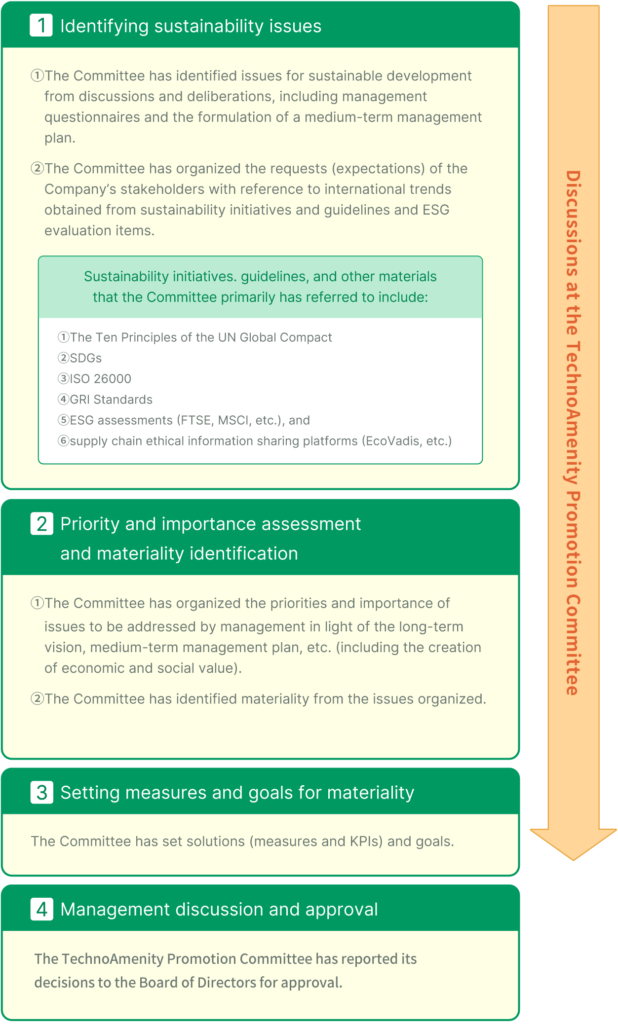Materiality (FY2022-2024)
Click here for the Materiality (FY2025-)
To achieve the FY2030 Goals set forth in the Long-term vision “TechnoAmenity for the future,” the Nippon Shokubai Group is currently working on “Three transformations” under the Mid-term Management Plan “TechnoAmenity for the future-Ⅰ.” We will appropriately manage the progress of initiatives for the “Three transformations” by identifying materiality (material issues) and clearly setting KPIs (key performance indicators), specific goals and target years.
For the identification of materiality, we determined the scope of challenges to be tackled through discussions at the Sustainability Promotion Committee (formerly the TechnoAmenity Promotion Committee) , narrowed down the scope by reference to the Group’s long-term vision and “TechnoAmenity for the future-Ⅰ,” and obtained approval from the Board of Directors after repeated deliberations in the Sustainability Promotion Committee.
Materiality Identification Process

Materiality and Initiatives
Promote climate change response
Contribution to SDGs :



| Initiatives | KPI and their ideal state | Year of achievement | Actual performance in FY2024 |
|---|---|---|---|
| Contribute to carbon neutrality | ・ Scope 1, Scope 2: reduce CO2 emissions by 30% from the 2014 level (Nippon Shokubai and Group Companies in Japan) | End of FY2030 | Reduced by 16.8% (including an offset equivalent to 6.9% through the purchase of carbon offset city gas) |
| Contribute to the circular economy | ・ Develop and socially implement technologies for resource use reduction and recycling | ー | |
| Promote the development and sales of Environmentally Contribution Products | Environmental Contribution Products Revenue: (1) 55 billion yen (2) 135 billion yen | (1) End of FY2024 (2) End of FY2030 | 47 billion yen |
* CO2 emissions : Our Group’s emissions reduction targets are for greenhouse gases, but since they are mostly carbon dioxide (CO2), they are referred to as CO2.
Contribute to solving customer issues
Contribution to SDGs :



| Initiatives | KPI and their ideal state | Year of achievement | Actual performance in FY2022-FY2024 |
|---|---|---|---|
| ・ Strengthen the company’s ability to understand issues and propose solutions ・ Strengthen the supply chain management | (1) Develop a platform to strengthen solution proposals (2) Expand the Solutions business to achieve the dual focus of the Materials and Solutions businesses (Sales ratio of 50% each, revenue of the 500 billion yen level) | (1) End of FY2024 (2) End of FY2030 | (1)-1 Expanded workforce by 100 employees to Solutions Business (1)-2 Established an information-sharing platform through the introduction of SFA*1 and CRM *2, etc. (2) Sales ratio of Solutions Business: 28.6% (FY2024) |
*1 SFA: Sales Force Automation system
*2 CRM: Customer Relationship Management system
Promote safe and stable production activities
| Initiatives | KPI and their ideal state | Year of achievement | Actual performance in FY2024 |
|---|---|---|---|
| ・ Strengthen the safety foundations ・ Foster a culture of safety | ・ Third-party evaluation: maintain above industry standards for the petroleum and petrochemical industries | ー | ・ Conducted a third-party evaluation at the Kawasaki Plant in FY2022 → Confirmed the maintenance of levels above industry standards ・ Planned to conduct a third-party evaluation at the Himeji Plant in FY2026 |
Developing/Promoting the Active Participation of Talent
Contribution to SDGs :



| Initiatives | KPI and their ideal state | Year of achievement | Actual performance in FY2024 |
|---|---|---|---|
| Develop autonomous talent | ・ Improve the employee engagement score (transformation and growth of people and workplaces through early establishment of a new personnel system, linkage with multi-layered measures, and organizational improvement) ・ Increase in the number of applicants for solicit publicly proposed autonomous learning programs (e-learning, skill development training, online English conversation classes, etc.) and make these programs better known within the company | End of FY2024 | ・ Improved the employee engagement score (FY2022: CCC, FY2024: B) ・ Publicly proposed autonomous learning programs: the participation rate remained around 20% (approximately 500 participants out of 2,500 employees) from FY2022 to FY2024, which indicates a widespread understanding of these programs |
| Promote the active participation of diverse talent | ・ Improve the employee engagement score (promotion of suitable assignments, individual motivation, and diverse and autonomous work styles through various systems such as self-assessment and the continuity of work location) ・ Increase the ratio of female employees hired in the clerical and chemical fields to at least 30% ・ Increase the ratio of females in managerial position to 6% or more | End of FY2024 | ・ Improved the employee engagement score (FY2022: CCC, FY2024: B) ・ Rate of female employees hired in the clerical and chemical fields: 38.8% ・ Rate of females in managerial positions: 6.3% |
Strengthen corporate governance
| Initiatives | KPI and their ideal state | Year of achievement | Actual performance in FY2024 |
|---|---|---|---|
| Enhance the effectiveness of the Board of Directors | ・ Improve the effectiveness of the Board of Directors by enhancing its decision-making of anagement policy and strategy, and supervisory functions | End of FY2024 | Confirmed with a third-party evaluation that the effectiveness of Board of Directors was ensured |
| Ensure the knowledge, experience, skills, and diversity of the Board of Directors | ・ Satisfy the skills matrix of the Board of Directors | End of FY2024 | ・ Enhanced the disclosure of skills matrix, including the reasons for selection ・ Discussion ongoing at the Board of Directors |
| Enhance medium- to long-term incentives for corporate officers | ・ Introduce stock-based compensation for Inside Directors of the Board, etc. | End of FY2022 | Decided partially revise the performance-linked stock compensation system (implemented in July 2025, For details please refer to “Notice Regarding Partial Amendment and Continuation of Performance-linked Stock Compensation Plan.”) |